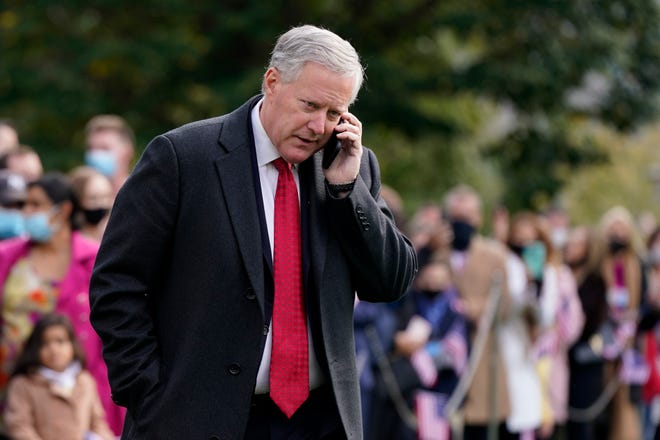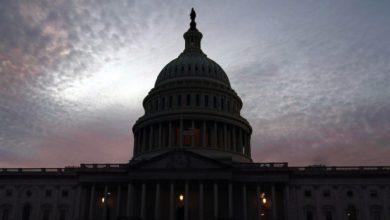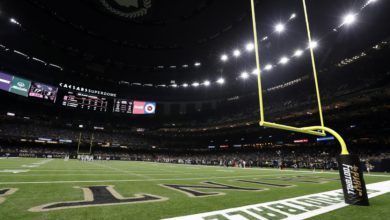
WASHINGTON – Mark Meadows, is suing House Speaker Nancy Pelosi and the members of the House Committee investigating the Jan. 6 insurrection after the panel threatened to pursue a contempt citation against the former White House chief of staff for Donald Trump.
In the lawsuit filed late Wednesday, Meadows is asking the U.S. District Court for the District of Columbia to invalidate "overly broad and unduly burdensome" subpoenas the committee issued for records and to force him to appear Wednesday.
The committee, Meadows argues in the lawsuit, "acts absent any valid legislative power and threatens to violate longstanding principles of executive privilege and immunity that are of constitutional origin and dimension."
Leaders of the House committee investigating the Jan. 6 insurrection at the Capitol said they would pursue a contempt citation for Meadows, and recommend possible criminal charges.
Wyoming GOP Rep. Liz Cheney, vice chair of the committee, told reporters late Wednesday that Meadows already has turned over "interesting, non-privileged documents" including text messages and emails relating to the president's activities during Jan. 6.
"He took an oath. He has an obligation under the law and the committee will be moving forward on contempt," she said. "He has an obligation to answer the questions as he's compelled to do under the subpoena about the non-privileged texts and emails that he has already turned over to the committee."
Meadows, a former House member who defied a committee subpoena by refusing to testify Wednesday, became the third witness to tangle with the committee over subpoenas for documents and testimony.
Political strategist Steve Bannon faces a July 18 trial on criminal contempt charges. The committee will meet again Dec. 16 with former Justice Department official Jeffrey Clark before deciding whether to pursue contempt charges against him.
“There is no legitimate legal basis for Mr. Meadows to refuse to cooperate with the Select Committee and answer questions about the documents he produced, the personal devices and accounts he used, the events he wrote about in is newly released book, and, among other things, his other public statements,” Rep. Bennie Thompson, the committee chairman, told Meadows' lawyer Tuesday in a letter.

“The Select Committee is left with no choice but to advance contempt proceedings and recommend that the body in which Mr. Meadows once served refer him for criminal prosecution,” Thompson added.
The committee is investigating what led to the Jan. 6 attack on Capitol and how the White House responded. The mob ransacked the building, injured 140 police officers and temporarily halted the counting of Electoral College votes that certified President Joe Biden's victory over Trump.
Meadows’ position on cooperating with the committee has changed a few times. His lawyer, George Terwilliger, initially said he wouldn’t cooperate because of Trump’s assertion of executive privilege to keep communications with aides confidential.
More: Can Trump run out the clock with executive privilege claim?
After Bannon was charged, Meadows provided emails and said he would sit for a deposition with the committee.
But then Terwilliger notified the committee Tuesday that he wouldn’t cooperate with the deposition. Terwilliger said Meadows agreed to provide thousands of pages of documents and testify about non-privileged matters.
Meadows provided a Nov. 7, 2020, email discussing the appointment of alternate slates of electors as part of a “direct and collateral attack” on the election, according to Thompson, D-Miss. And Meadows provided a Jan. 5 email regarding a 38-page PowerPoint briefing titled “Election Fraud, Foreign Interference & Options for Jan. 6,” according to Thompson.
But Meadows also provided a log indicating he wanted to withhold several hundred additional documents, according to Thompson. Meadows also withheld more than 1,000 text messages from his personal cell phone, Thompson said.
“The Select Committee is trying to ascertain facts that place the January 6th attack on the Capitol in context, not conduct a law enforcement inquiry,” Thompson said.
Members of the committee said Meadows couldn’t write a book about his interactions with Trump and then claim his conversations were confidential. Meadows has been promoting his book, "The Chief’s Chief."
Trump is fighting in federal court a committee subpoena to the National Archives and Records Administration for thousands of pages of contested documents. The D.C. Circuit Court of Appeals heard oral arguments Nov. 30, and a decision could come any day.
Contributing: Erin Mansfield, Savannah Behrmann
Source link








